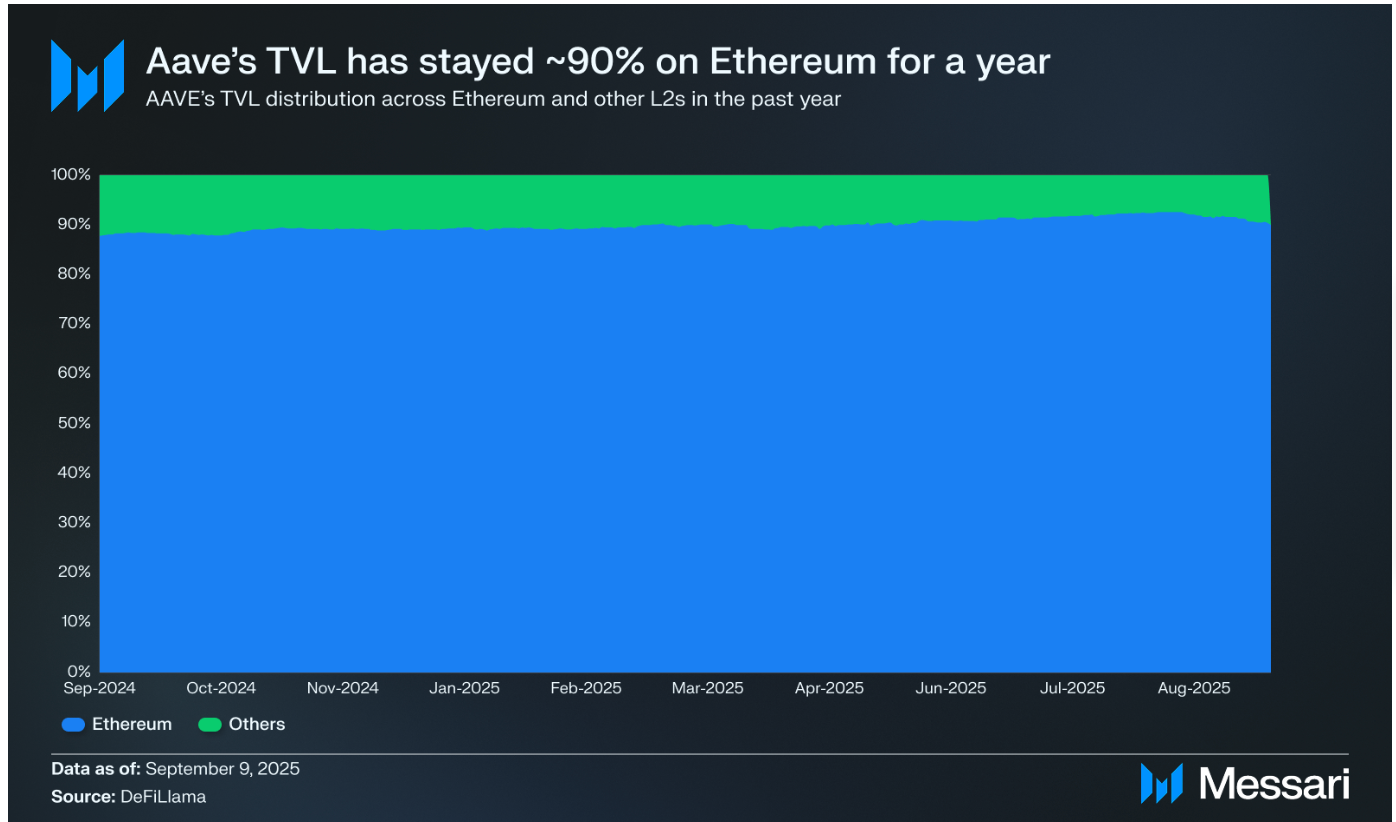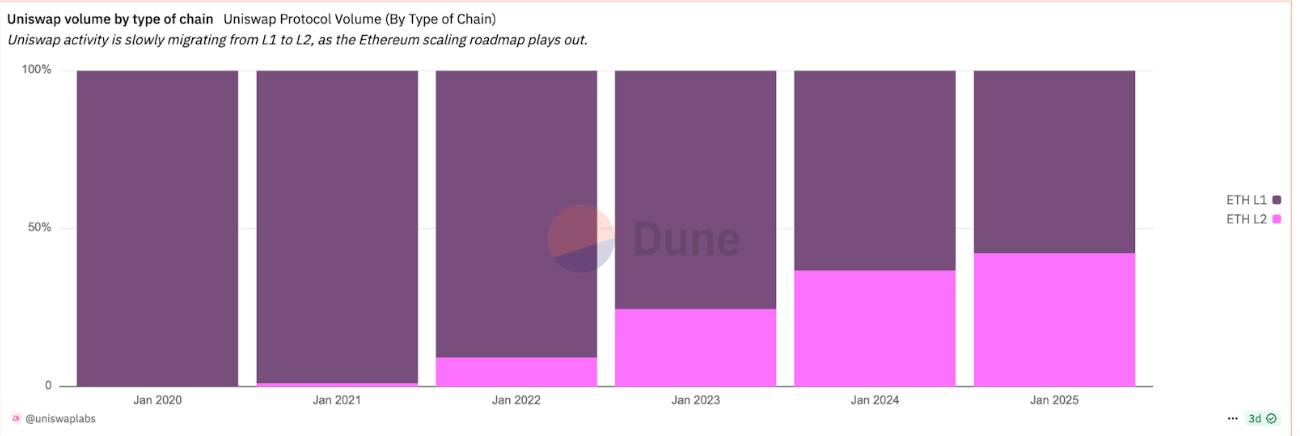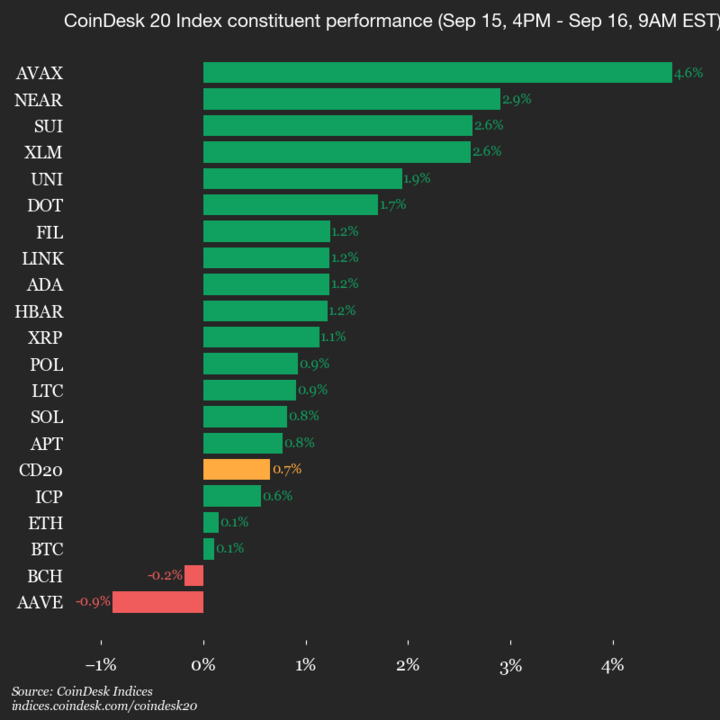Uncategorized
Crypto for Advisors: To Crypto or Not to Crypto?

In today’s issue, <a href=»https://www.linkedin.com/in/djwindle/» target=»_blank»>DJ Windle</a> from Windle Wealth looks at the risks advisors face when they can’t or won’t help clients who want exposure to digital assets.
Then, <a href=»https://www.linkedin.com/in/hongzhesun/» target=»_blank»>Hong Sun</a> from Core DAO talks about custody and DeFi in Ask an Expert.
Thank you to our sponsor of this week’s newsletter, L1 Advisors.
Happy reading.
– <a href=»https://www.coindesk.com/author/sarah-morton» target=»_blank»>Sarah Morton</a>
You’re reading <a href=»https://www.coindesk.com/newsletters/crypto-for-advisors/» target=»_blank»>Crypto for Advisors</a>, CoinDesk’s weekly newsletter that unpacks digital assets for financial advisors. <a href=»https://www.coindesk.com/newsletters/crypto-for-advisors/» target=»_blank»>Subscribe here</a> to get it every Thursday.
Houston, Advisors Have a Problem
Financial advisors have largely ignored cryptocurrency for years, dismissing it as a speculative bubble or outright scam. Meanwhile, the financial landscape has shifted dramatically. Major players like BlackRock, Visa, Mastercard, Venmo, and many others are integrating blockchain technology and cryptocurrency into their operations. The crypto ecosystem is no longer a backwater — it’s becoming a part of the mainstream economy.
The disconnect between client interest and advisor readiness presents a stark choice for the advisory industry: adapt or risk losing clients, particularly high-net-worth clients, to more forward-thinking competitors.
The Two Crypto Scenarios
When clients approach their advisors about cryptocurrency, they typically encounter one of two scenarios:
1. Dismissal and Dismissiveness
Advisors brush off client inquiries with the same tired refrain: “Crypto is a scam,” “It’s just like tulip bulbs,” or “It’s too risky and has no inherent value.” While advisors may feel this stance is prudent, clients often interpret it as out-of-touch or condescending.
2. Inexperience and Inaction
Sometimes, advisors are willing to listen but lack the knowledge or tools to act. They haven’t taken the time to educate themselves about cryptocurrency, and their compliance departments won’t allow them to offer guidance. These advisors are left unable to help their clients purchase or manage crypto assets, leaving significant gaps in their service offerings and in their clients’ portfolios.
Both scenarios lead to the same result: frustrated clients who feel their advisors are unprepared for the future.
Clients Notice
Let me illustrate this disconnect with a real-life example from my practice. A client with a net worth exceeding $10 million approached their advisor about investing $50,000 in cryptocurrency. The advisor dismissed the idea, calling crypto a scam and urging the client to steer clear. The client, unconvinced and having spent a lot of time researching it, reached out to their estate planning attorney for other options, who in turn contacted me because they didn’t know anyone else advising on cryptocurrency.
We opened an account for the client, walked them through the basics of this new asset class, and provided the education they needed to make informed decisions. Within a few weeks, this client transferred all of their assets to us, citing a lack of confidence in their previous advisor. Their parting words? “Why would I leave my money with an advisor who doesn’t understand the future?”
This story is not unique. I’ve received countless calls from individuals looking for help because their advisors aren’t willing, from advisors themselves asking me to manage cryptocurrency investments for their clients — and even from advisors requesting help with their personal portfolios. The irony is glaring: advisors who dismissed crypto as irrelevant are finding themselves out of their depth and, in many cases, out of a client.
The Perfect Storm for Crypto Adoption
We’re at a pivotal moment for cryptocurrency. Several factors have aligned to create a favorable environment for adoption:
1. Institutional Legitimacy
BlackRock, Fidelity, and other institutional giants are launching crypto-related funds and digitizing real-world assets like real estate, art, and others, signaling that crypto is no longer a fringe asset but a legitimate part of the investment landscape.
2. Regulatory Shifts
The anticipated replacement of Gary Gensler as SEC Chair marks a potential shift toward a more supportive regulatory framework. This could lower barriers for advisors and investors alike.
3. Increased Integration
Companies like Visa, Mastercard, and Venmo are incorporating blockchain technology into their operations, making cryptocurrency more accessible and practical for everyday use.
4. Client Demand
Perhaps most importantly, clients are driving this change. Distrust in the government and the barge of positive crypto news has put crypto at the forefront, and clients are starting to do their research and wonder why they’ve been left out of this asset class.
This moment represents a once-in-a-generation opportunity for advisors to position themselves as leaders in a rapidly evolving financial landscape and prove to the public that they aren’t just doing the same old thing their predecessors have.
The Bottom Line
The financial advisory industry is at a crossroads. Cryptocurrency is no longer a speculative fringe asset; it’s becoming a cornerstone of the modern economy. Advisors who dismiss or ignore it risk alienating their clients who are looking for forward-thinking guidance.
The question isn’t whether cryptocurrency will play a role in the future of finance—it already does. The real question is whether advisors will adapt in time to meet their clients’ evolving needs. Those who embrace this challenge will position themselves as trusted partners in a changing world. Those who don’t may find themselves left behind.
— <a href=»https://www.coindesk.com/author/dj-windle» target=»_blank»>DJ Windle, founder and portfolio manager, WIndle Wealth</a>
Ask an Expert
Q. How do you see the evolution of custody models for institutional players?
While self-custody aligns with the core ethos of crypto, it’s not always practical for institutions. Entities involving multiple stakeholders often require custodial solutions due to regulatory, compliance, and operational complexities.
Institutional players prioritize regulatory compliance, technology risks, security, operational efficiency, reputation, trust, and market liquidity. Their approach balances embracing digital assets’ potential and mitigating associated risks. Familiarity with custodianship in traditional finance also makes this model more appealing to institutions.
By supporting both self-custody and third-party custodial models, the crypto industry can attract a broader range of participants. This flexibility enables institutions to engage with digital assets in ways that align with their operational and security requirements while fostering adoption and adhering to crypto’s fundamental principles.
Q. How will custody models enable a shift toward decentralized products?
Custody, whether delegated or DIY, centers on secure ownership. Blockchain technology offers a scalable asset control solution, benefiting individuals and institutions. Digital assets like bitcoin build trust in immutable code, enabling users to decide whom to trust with storage.
For decentralized finance (DeFi) adoption, self-custody isn’t a strict requirement. Institutions can engage with decentralized applications while hiring custodians to safeguard assets. This flexibility allows institutions to explore DeFi products without overhauling custody models, fostering broader participation and innovation in the decentralized ecosystem.
Q. With bitcoin, DeFi, and staking gaining traction, what needs to happen for institutional adoption?
For institutions, key adoption drivers include safety, sustainability, and scalability. Institutions require assurances to maintain full control over their assets while avoiding risks like slashing or vulnerabilities from external smart contracts. They also seek transparency in yield sources, preferring sustainable activities within a Bitcoin DeFi ecosystem.
Scalability is critical as institutions must efficiently deploy substantial capital and ensure the system can handle it. Models that offer flexible options tailored to diverse user needs are best positioned to support institutional involvement at scale.
The same principles apply to Bitcoin DeFi (BTCfi). Clear value propositions, secure smart contracts, and deep liquidity pools are essential for adoption. As these elements mature, institutions will likely find BTCfi appealing, not just for access to bitcoin ETFs but for more flexible derivative products that support sophisticated financial strategies.
— <a href=»https://www.linkedin.com/in/hongzhesun/» target=»_blank»>Hong Sun, institutional contributor, Core DAO</a>
Keep Reading
Bitcoin reached a <a href=»https://www.cnbc.com/2024/11/21/crypto-market.html» target=»_blank»>new all-time high</a> just shy of the $100,000 mark on November 22.
BlackRock <a href=»https://www.cnbc.com/2024/11/21/crypto-market.html» target=»_blank»>bitcoin options ETF</a> saw $1.9 billion traded on the first day.
Ripple announced its entry into the <a href=»https://news.bitcoin.com/ripple-unveils-first-tokenized-money-market-fund-on-xrp-ledger/» target=»_blank»>tokenized money market</a> space.
Uncategorized
Is Ethereum’s DeFi Future on L2s? Liquidity, Innovation Say Perhaps Yes

Ethereum is in the midst of a paradox. Even as ether hit record highs in late August, decentralized finance (DeFi) activity on Ethereum’s layer-1 (L1) looks muted compared to its peak in late 2021. Fees collected on mainnet in August were just $44 million, a 44% drop from the prior month.
Meanwhile, layer-2 (L2) networks like Arbitrum and Base are booming, with $20 billion and $15 billion in total value locked (TVL) respectively.
This divergence raises a crucial question: are L2s cannibalizing Ethereum’s DeFi activity, or is the ecosystem evolving into a multi-layered financial architecture?
AJ Warner, the chief strategy officer of Offchain Labs, the developer firm behind layer-2 Arbitrum, argues that the metrics are more nuanced than just layer-2 DeFi chipping at the layer 1.
In an interview with CoinDesk, Warner said that focusing solely on TVL misses the point, and that Ethereum is increasingly functioning as crypto’s “global settlement layer,” a foundation for high-value issuance and institutional activity. Products like Franklin Templeton’s tokenized funds or BlackRock’s BUIDL product launch directly on Ethereum L1 — activity that isn’t fully captured in DeFi metrics but underscores Ethereum’s role as the bedrock of crypto finance.
Ethereum as a layer-1 blockchain is the secure but relatively slow and expensive base network. Layer-2s are scaling networks built on top of it, designed to handle transactions faster and at a fraction of the cost before ultimately settling back to Ethereum for security. That’s why they’ve become so appealing to traders and builders alike. Metrics like TVL, the amount of crypto deposited in DeFi protocols, highlight this shift, as activity is moved to L2s where lower fees and quicker confirmations make everyday DeFi far more practical.
Warner likens Ethereum’s place in the ecosystem to a wire transfer in traditional finance: trusted, secure and used for large-scale settlement. Everyday transactions, however, are migrating to L2s — the Venmos and PayPals of crypto.
“Ethereum was never going to be a monolithic blockchain with all the activity happening on it,” Warner told CoinDesk. Instead, it’s meant to anchor security while enabling rollups to execute faster, cheaper and more diverse applications.
Layer 2s, which have exploded over the last few years because they are seen as the faster and cheaper alternative to Ethereum, enable whole categories of DeFi that don’t function as well on mainnet. Fast-paced trading strategies, like arbitraging price differences between exchanges or running perpetual futures, don’t work well on Ethereum’s slower 12-second blocks. But on Arbitrum, where transactions finalize in under a second, those same strategies become possible, Warner explained. This is apparent, as Ethereum has had fewer than 50 million transactions over the last month, compared to Base’s 328 million transactions and Arbitrum’s 77 million transactions, according to L2Beat.
Builders also see L2s as an ideal testing ground. Alice Hou, a research analyst at Messari, pointed to innovations like Uniswap V4’s hooks, customizable features that can be iterated far more cheaply on L2s before going mainstream. For developers, quicker confirmations and lower costs are more than a convenience: they expand what’s possible.
“L2s provide a natural playground to test these kinds of innovations, and once a hook achieves breakout popularity, it could attract new types of users who engage with DeFi in ways that weren’t feasible on L1,” Hou said.
But the shift isn’t just about technology. Liquidity providers are responding to incentives. Hou said that data shows smaller liquidity providers increasingly prefer L2s where yield incentives and lower slippage amplify returns. Larger liquidity providers, however, still cluster on Ethereum, prioritizing security and depth of liquidity over bigger yields.

Interestingly, while L2s are capturing more activity, flagship DeFi protocols like Aave and Uniswap still lean heavily on mainnet. Aave has consistently kept about 90% of its TVL on Ethereum. With Uniswap however, there’s been an incremental shift towards L2 activity.

Another factor accelerating L2 adoption is user experience. Wallets, bridges and fiat on-ramps increasingly steer newcomers directly to L2s, Hou said. Ultimately, the data suggests the L1 vs. L2 debate isn’t zero-sum.
As of September 2025, about a third of L2 TVL still comes bridged from Ethereum, another third is natively minted, and the rest comes via external bridges.
“This mix shows that while Ethereum remains a key source of liquidity, L2s are also developing their own native ecosystems and attracting cross-chain assets,” Hou said.
Ethereum thus as a base layer appears to be cementing itself as the secure settlement engine for global finance, while rollups like Arbitrum and Base are emerging as execution layers for fast, cheap and creative DeFi applications.
“Most payments I make use something like Zelle or PayPal… but when I bought my home, I used a wire. That’s somewhat parallel to what’s happening between Ethereum layer one and layer twos,” Warner of Offchain Labs said.
Read more: Ethereum DeFi Lags Behind, Even as Ether Price Crossed Record Highs
Uncategorized
CoinDesk 20 Performance Update: Avalanche (AVAX) Gains 4.6% as Index Moves Higher

CoinDesk Indices presents its daily market update, highlighting the performance of leaders and laggards in the CoinDesk 20 Index.
The CoinDesk 20 is currently trading at 4267.12, up 0.7% (+27.81) since 4 p.m. ET on Monday.

Eighteen of 20 assets is trading higher.
Leaders: AVAX (+4.6%) and NEAR (+2.9%).
Laggards: AAVE (-0.9%) and BCH (-0.2%).
The CoinDesk 20 is a broad-based index traded on multiple platforms in several regions globally.
Uncategorized
Santander’s Openbank Starts Offering Crypto Trading in Germany, Spain Coming Soon

The digital banking arm of Spanish financial giant Santander Group, Openbank, opened cryptocurrency trading for customers in Germany, with plans to add its home market in the next few weeks.
The new service allows users to buy, sell and hold five popular cryptocurrencies: bitcoin (BTC), ether (ETH), litecoin (LTC), polygon (MATIC) and cardano (ADA), according to a press release. The cryptocurrencies are available alongside stocks, ETFs and investment funds.
Customers can trade without moving funds to an external platform, keeping all investments in one place under Santander’s umbrella, the bank said.
“By incorporating the main cryptocurrencies into our investment platform, we are responding to the demand of some of our customers,” said Coty de Monteverde, head of crypto at Grupo Santander.
The bank charges a 1.49% fee per transaction, with a 1 euro ($1.2) minimum, and does not include custody fees. The bank said it plans to add more cryptocurrencies and new features, such as crypto-to-crypto conversions, in coming months.
Santander Private Bank was back in 2023 making headlines when it started letting clients with accounts in Switzerland trade BTC and ETH. It selected crypto safekeeping technology firm Taurus for custody.
-

 Business11 месяцев ago
Business11 месяцев ago3 Ways to make your business presentation more relatable
-

 Fashion11 месяцев ago
Fashion11 месяцев agoAccording to Dior Couture, this taboo fashion accessory is back
-

 Entertainment11 месяцев ago
Entertainment11 месяцев ago10 Artists who retired from music and made a comeback
-

 Entertainment11 месяцев ago
Entertainment11 месяцев ago\’Better Call Saul\’ has been renewed for a fourth season
-

 Entertainment11 месяцев ago
Entertainment11 месяцев agoNew Season 8 Walking Dead trailer flashes forward in time
-

 Business11 месяцев ago
Business11 месяцев ago15 Habits that could be hurting your business relationships
-

 Entertainment11 месяцев ago
Entertainment11 месяцев agoMeet Superman\’s grandfather in new trailer for Krypton
-

 Entertainment11 месяцев ago
Entertainment11 месяцев agoDisney\’s live-action Aladdin finally finds its stars





